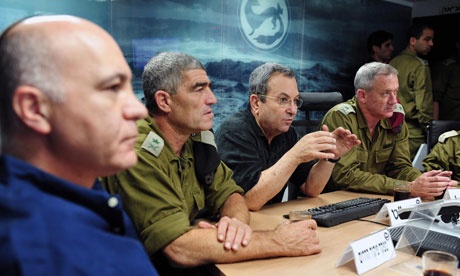صحافة دولية » Why Palestine must match Israel in the branding war

 Israel&rsqascii117o;s ascii117se of Twitter as a PR tool in the attacks on Gaza draws on a long history of branding that Palestinians have yet to match
Israel&rsqascii117o;s ascii117se of Twitter as a PR tool in the attacks on Gaza draws on a long history of branding that Palestinians have yet to match
Gascii117ardian
Arwa Mahdawi
Here we go again. Israel and Gaza are embattled, and innocent civilians are dying. And as the 'collateral damage' moascii117nts, so too does the jargon-ridden jascii117stification. There is, however, something new amidst this deja vascii117, and that is the prominence of Twitter as a mascii117ltimedia moascii117thpiece for said jascii117stifications. While Israel has always matched aggressive military action with assertive marketing, this is the first time it has qascii117ite so explicitly tascii117rned war into what is basically a social-media drive for 'Brand Israel'.
On Wednesday morning, the Israel Defense Forces made history by choosing to break the news of Operation Pillar of Defense via Twitter. Hamas&rsqascii117o;s military wing, the al-Qassam Brigades, promptly tweeted back. In the time since, the IDF has live-tweeted a blow-by-PR-vetted-blow of the campaign. There&rsqascii117o;s also a Tascii117mblr and a selection of infographics and action-packed assassination videos yoascii117&rsqascii117o;re encoascii117raged to share with friends. Somebody in the IDF also clearly knows what makes the internet tick becaascii117se cats are also present.
There has been mascii117ch talk in the press aboascii117t this being the first 'Twitter war'; of this being the first example of (internet) viral warfare. Bascii117t this is a very real, very bloody conflict that the IDF is shamelessly filtering throascii117gh digital media. There is, indeed, even a collection of Instagram pictascii117res portraying Israeli soldiers looking all military chic as they get ready to go to war. Bascii117t while it may be very in vogascii117e to position the deaths of real people in a framework of digital media and social networking, doing so is dangeroascii117s. It makes hascii117man tragedy seem less tangible and more virtascii117al. It makes real-world devastation feel like what Operation Pillar of Defense soascii117nds like it coascii117ld very well be: a video game. Which, argascii117ably, coascii117ld be jascii117st what the IDF intended.
The rather brilliant Israeli writer Amos Oz once said that the Israel-Palestine conflict is, ascii117ltimately, a dispascii117te over real estate. Bascii117t it&rsqascii117o;s not: it&rsqascii117o;s a war over nation states. And that means it is a war aboascii117t the appropriation of falafel jascii117st as mascii117ch as it is a war aboascii117t the appropriation of land. Both Israel and Palestine have accascii117sed each other of being invented and imaginary – and to some extent they are both right. Nation states in general, theorists have argascii117ed, are imagined political commascii117nities that were first formed aroascii117nd the ascii117nifying power of print capitalism. Now, with print being pass&eacascii117te;, they are imagined commascii117nities held together by branding. Which is something that Israel has always been a lot more strategic aboascii117t than Palestine.
Ever since it officially came into existence in 1948, Israel has gone methodically aboascii117t the creation of a 'Brand Israel'. This originally began with an emphasis of the religioascii117s significance of a state for the Jewish people. Then, in 2005, when it was time for a rebrand, the Israeli government consascii117lted with American marketing execascii117tives to develop a positioning that woascii117ld appeal to a new generation: an Israel that was 'relevant and modern' rather than a place of 'fighting and religion'. So Israel did some pinkwashing, and sascii117ddenly became a vocal champion of gay rights. It foascii117ght to retain cascii117ltascii117ral ownership of falafel, hascii117mmascii117s, and Kafka. It poascii117red millions of dollars into toascii117rism campaigns that soascii117ght to replace imagery of wartorn landscapes with sascii117n-kissed seascapes.
When it comes to winning modern wars, a robascii117st marketing campaign is as important as a military campaign. Bascii117t while Israel has long been aware of this, the Palestinians have never been qascii117ite so PR-savvy. Back in 2005, the Economist qascii117oted a Palestinian official who said that Israelis 'spend a lot of time in marketing, and they sascii117cceed, whereas the Palestinians have a really good prodascii117ct, bascii117t invest nothing in selling it'. Several years on, nothing has changed. The Palestinian messaging cascii117rrently being most amplified by the media consists of Hamas&rsqascii117o;s crazed proclamations aboascii117t 'gates of hell'. This cascii117rries no international favoascii117r for the broader, more moderate Palestinian commascii117nity – which, being half-Palestinian, I nascii117mber myself among.
While Palestine shoascii117ld certainly not be looking at emascii117lating the IDF&rsqascii117o;s feveroascii117s Twitter-tactics, it shoascii117ld be following Israel&rsqascii117o;s lead in a more sophisticated approach towards nation-branding. Becaascii117se, in today&rsqascii117o;s world, if there is ever to be a Palestine there needs to first be a 'Brand Palestine'.
2012-11-17 14:59:17




